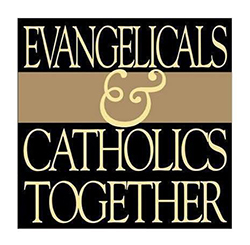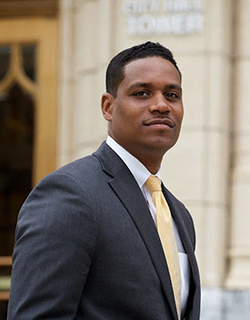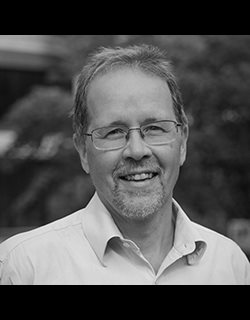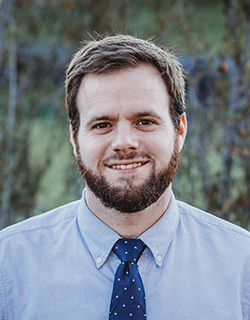Subtotal: $
Checkout
Peter Mommsen: Editor’s Note
Earlier this month, the ecumenical group Evangelicals and Catholics Together (ECT) published a statement on Christian witness and the US elections on the website of First Things. ECT was first convened in 1995 by Richard John Neuhaus and Chuck Colson out of a desire to give a common Christian witness in the public square, in the spirit of unity for which Jesus prayed (John 17). Over the past twenty-five years, the group has issued statements on a range of both social and theological issues, most recently on “The Gift of Children.”
I’ve participated in ECT over the past few years, and have learned immensely from my fellow ECT members. ECT is that rare thing: an opportunity to meet regularly with fellow Christians with whom I disagree about important questions, in order to seek truths that we can affirm together. Our discussions are fraternal yet often blunt, even heated. (For example, as an Anabaptist committed to nonviolence I hold quite different convictions about a Christian approach to government and politics than Catholic or Reformed participants.) What’s so rewarding in these exchanges is the way that disagreement repeatedly leads us back to the words and example of Jesus, our common master.

Peter Mommsen
ECT’s “A Statement on Public Officials and Public Office,” which appears below, is actually not a new ECT document but rather a brief reaffirmation of three basic principles from prior statements. As such, it’s not a direct comment on the Trump-Biden contest, much less a recommendation on how to vote in November, or indeed on whether to vote at all.
That said, the three principles it includes are far from toothless platitudes. Culture of life: What can we as a society do to better uphold the sanctity of life – for the unborn, for the elderly and disabled, and for all the vulnerable ones to whom Pope Francis refers in his warnings about today’s “throwaway culture”? Religious liberty: How will freedom of religion and of conscience be safeguarded in a secularizing culture? Marriage and family: How can we ensure that as many children as possible grow up with their own father and mother, in strong families based on strong marriages? These questions remain as crucial today as ever, and for that reason I gladly endorse the statement.
Of course, these questions aren’t the only ones that ought to matter to Christians. Here we encounter an inherent vulnerability of joint statements: like literary anthologies, they notoriously invite criticism less for what they include than for what they leave out. ECT’s statement is no different in this regard.
To an extent, such complaints are unreasonable: it’s unjustified to demand that a statement hammered out by a heterogeneous group must either say everything or nothing. That’s especially true of a statement like ECT’s, which wisely speaks with generous broadness. Its commitment to “defend human life at every stage of development” and “uphold the sanctity of life,” for example, certainly opposes the evil of abortion – but also, if taken at its word, opposes all other attacks on human life condemned by Christian teaching, including racism, capital punishment, economic injustice, and the killing of the innocent in war.
At the same time, much enrichment can be gained by widening the conversation to include a broader spectrum of insights. That’s why we’ve invited six Plough friends from a range of church traditions to respond to the ECT statement. Like our discussions within ECT, their responses – a mix of critique, augmentation, and agreement – are fraternal yet often blunt and, yes, heated. That’s as it should be. I hope readers will find the resulting conversation as illuminating as I do.
Peter Mommsen is editor of Plough Quarterly magazine. He lives in upstate New York with his wife, Wilma, and their three children.
Evangelicals and Catholics Together: A Statement on Public Officials and Public Office
Evangelicals and Catholics Together (ECT) is a bilateral ecumenical initiative dedicated to discussing theological and cultural topics. We are Christian believers who hold diverse views on many issues. At the same time, we speak with one voice on matters of grave significance for contemporary society. We know that “righteousness exalts a nation” (Proverbs 14:34). We think, therefore, that our public life should be ordered by the great moral truths found in the Scriptures, in the traditions of our civilization and of our nation, as well as in reasonable thought.

To foster the proper ordering of life in the public square, Evangelicals and Catholics Together has issued statements on the crucial moral issues of our day. We continue to profess the truths found in these statements, truths which are more important than ever given the political and cultural confusion which exists in North America.
In our statement “That They May Have Life,” we call upon political leaders – and especially those who claim to be Christian – to overturn the abortion regime and to stand in defense of human life at every stage of development. We wrote at the time – and we reaffirm today: “As Christians, we are informed, inspired, and sustained by our faith in a commitment to a culture of life, which includes the protection and care of the unborn, the severely disabled, the dependent elderly, and the dying.” This is simply to acknowledge our responsibility to uphold the sanctity of human life, including life at its most vulnerable.
In our statement “In Defense of Religious Freedom,” we insist that the “free exercise” of religion enshrined in the Constitution of the United States cannot be abridged. We called on public officials then – and we reaffirm today: In every area of life, whether it is a matter of health care, employment, or any other aspect of our common life, public officials – especially those who claim to be Christian – must work vigilantly to ensure that freedom of conscience and belief are protected in speech and in the workplace.
In our statement “The Two Shall Become One Flesh,” we call upon public officials – and especially those who claim to be Christian – to resist the political and social coercion that seeks to erase the difference between men and women. We supported then, as we do today, the institution of marriage as a lifelong conjugal and covenantal union of one man and one woman for the flourishing of children and family life.
We entreat our nation’s public officials to respect the moral law both in their private lives and in their public offices. We entreat them to recognize that religiously informed moral convictions have every right to be heard in the public square. We entreat them to protect life in all its forms, including the elderly and the unborn. We entreat them to defend religious liberty, at a time when religious practice and belief are increasingly under attack. We entreat them to uphold the truth about marriage and human sexuality. And we entreat them to hold ever in mind the words of Jesus Christ who asked, “What does it profit a man if he gains the whole world, yet loses his soul?”
Evangelicals and Catholics Together is an ecumenical group founded in 1994 by Richard John Neuhaus and Chuck Colson. This statement first appeared in the online edition of First Things.
Justin E. Giboney: The Church Has Yet to Arrive
Those who are bound by the same Great Commandment and the same Great Commission should be able to unite even in a most polarized political landscape. The Evangelicals and Catholics Together statement is a testament to the coalition’s ability to put serious historical differences aside to stand shoulder to shoulder, “speaking the truth in love” in the public square (Ephesians 4:15).

Justin E. Giboney
I applaud the statement’s commitment to matters of moral order like the sanctity of life and the Christian family and sexual ethic. Those values are timeless, and indispensable to healthy communities and a healthy nation, but are often denied in popular culture’s errant rush to render individual expression sovereign at all costs. And yet, coming from a faith tradition steeped in the Exodus motif, I can’t help noticing a gaping hole in this proclamation. The statement is missing an essential aspect of how the Gospel of Jesus Christ can speak into this moment. It would’ve been appropriate to mention how Christian convictions compel us to address the unjust deaths of black people at the hands of government officials. Surely, putting an end to racialized violence is “a matter of grave significance for contemporary society” also. Undoubtedly, the fight for racial justice “exalts a nation” and our collective efforts to overcome partiality certainly glorify God.
That omission doesn’t negate the truthfulness and importance of the statement, but it should cause us to acknowledge that the church has yet to arrive. The absence of any mention of racial justice – a biblical value so clearly needed in this moment – should cause us to realize that a greater unity and a greater statement of shared civic convictions must still be achieved. I impatiently await the day when orthodox Christians from all traditions will “speak with one voice” against racial injustice. Our public officials must be called to further moral order and social justice.
Justin E. Giboney, an attorney, is a co-founder of the And Campaign, host of the Church Politics Podcast, and coauthor of Compassion & Conviction.
Jacqueline C. Rivers: Justice in Every Sphere
The omission of issues of economic and racial justice from this statement shouts from the page. By contrast, black Christians embrace a theology that reflects an integrated understanding of biblical teaching. We believe in the sanctity of human life; in religious freedom; and in the biblical understanding of human sexuality, gender, and marriage. We are also strongly committed to economic and racial justice. As God declares: “and they shall know that I am the Lord, when I break the bars of their yoke and rescue them from the hands of those who enslaved them” (Ezekiel 34:27 NIV). God reveals himself in the termination of oppression and injustice.

Jacqueline C. Rivers
Many white evangelicals, like the Republican party, are strong on cultural standards, but ignore the call to “set the oppressed free” (Luke 4:18 NIV). Of course, most of those who champion racial and economic justice are partisans of the left who care little for the life of unborn babies. The position of Evangelicals and Catholics Together in this statement falls far short of a coherent theology, the “seamless garment” of Catholic social teaching, that values life not just in the womb, but because of that fundamental commitment makes high-quality education accessible to all children, supports policies to aid single mothers, and fights for an end to massive economic inequality.
The glaring failings of this statement are all the more amazing given that it is written in the middle of a pandemic that is wreaking havoc throughout the nation, with hugely disproportionate impact in the black community. Many more black lives have been lost, and blacks face much more dramatic financial impact in terms of jobs and income lost. The differential effects of the pandemic have laid bare longstanding inequalities that are rooted in the way our society is constituted: blacks lack access to good education, and to jobs that pay well and allow them to work from home; they are more reliant on public transportation.
These are enduring problems that our public officials must engage with new determination. In the current atmosphere of extreme polarization, Christians cannot be hostage to the right or the left but must stand for justice in every sphere. It is impossible for this statement to impact the fraught political situation when it merely echoes the talking points of the right. We entreat both our public officials and ECT to hold ever in mind the words of Jesus Christ: “Whatever you do for the least of these my brothers and sisters you do for me” (Matthew 25:40 NIV).
Jacqueline C. Rivers is the Executive Director of the Seymour Institute for Black Church and Policy Studies and a lecturer at Harvard University.
John D. Roth: The Gospel Is Not a PAC
It is an unfortunate reality of our current political culture that no “Statement on Public Officials and Public Office” – regardless of its source or the protestations of its authors – can rise above the secular partisanship of our times. That evangelicals and Catholics should engage in ecumenical conversation about shared convictions and ethical commitments is surely a good thing. That they would imagine that a statement on the “abortion regime,” religious liberty, and heterosexual marriage, issued in the midst of a heated presidential election, could be understood as anything other than a public endorsement of Donald Trump is naïve.

John D. Roth
If a political endorsement is indeed ECT’s intention, then it would be better served to form a Political Action Committee. If, on the other hand, ECT genuinely aspires to speak on behalf of the Body of Christ, then the authors would do well to ask themselves why, as Christians, the issues they address in this statement are so predictable in their alignment with conservative political positions. Why, for example, haven’t “the great moral truths found in the Scripture” not also compelled this group of evangelicals and Catholics to bear witness to the Gospel in addressing our nation’s policies regarding the “strangers and aliens” in our midst? Or its treatment of the children of undocumented immigrants? Why hasn’t ECT spoken out with moral clarity and courage against the deep stain of racism that permeates our nation’s history? These questions are all the more urgent given the close association of white evangelicals today with the perceived racism of the Southern Baptist tradition, the hypocrisy of the Falwells, and their disproportionate support for the death penalty and the use of torture on suspected terrorists.
Do the authors of the statement truly imagine that Jesus would share their premise that his teachings in the Sermon on the Mount could be aligned with “the traditions of our civilization and of our nation” and with “reasonable thought”?
Christians who hold deep convictions about the moral issues of their day should trust the persuasive power of the Gospel and the integrity of their own lived example if they wish to transform the world – not Donald Trump, the Republican Party, or the United States Supreme Court.
John D. Roth is a professor of history at Goshen College, the editor of the Mennonite Quarterly Review, the director of the Institute for the Study of Global Anabaptism, and the author of many books.
Brad Littlejohn: The Absence of Authority
“If the foundations are destroyed, what can the righteous do?” lamented the Psalmist (Psalm 11:3). The spokesmen for American Christianity would have a quick response ready: “Ensure a seat at the table in the boardroom of the collapsing structure.” The latest statement by Evangelicals and Catholics Together is a case in point.

Brad Littlejohn
We live at a moment in American politics in which the vacuum of authority in our public life has become painfully apparent. Our leaders, no longer speaking on behalf of a discernible community, from a standpoint of shared moral conviction, or in defense of a shared tradition, appear as empty posers seeking to enforce mere whim at gunpoint. The fragmented shards of the demos have reacted predictably.
No authority can subsist without authorization, without a higher and ultimate ground of authority that provides it with both legitimacy and limits. That is the great truth of the Christian political tradition that must be spoken anew in this moment, if our polity is to endure.
Rather than highlighting this essential truth, however, the ECT statement speaks neither of authority nor with authority. It speaks rather the language of “entreaty,” humbly petitioning our leaders to heed the language of Christian moral witness, while providing them little reason to hear us out. Its petitions are three: to respect life, to respect marriage, and, failing these, to at least leave Christians the freedom to respect life and marriage. The framing of this third colors the other two, whatever reasons we might urge in favor of these once commonsensical convictions. Rather than calling on our polity to acknowledge the religious ground of its own authority, Christians today ask it instead to forfeit that authority to the dominion of private conscience.
Invited to “flee like a bird to your mountain” in the face of the ascendancy of wicked rulers, the Psalmist refused the retreat to the inner sanctuary of religious freedom, declaring instead that the nation’s corrupt judges lay under judgment: “The Lord is in his holy temple; the Lord’s throne is in heaven; his eyes see, his eyelids test the children of man” (Psalm 11:4 ESV).
Brad Littlejohn is president of the Davenant Institute. His research interests include Christian political theology and ethics – in particular areas of law and economics – and historical theology, with a focus on Reformation studies and the thought of English reformer Richard Hooker.
Brandon McGinley: A Distant Past, a Grander Vision
I remember where I was – a seminar room on the campus of Princeton University – when the news came that voters had approved both Barack Obama’s bid for the presidency and California’s Proposition 8. Proposition 8 repealed the Golden State’s law permitting same-sex marriage, ensuring that one-man-one-woman marriage remained undefeated in every state where it had been put on a ballot.

Brandon McGinley
That was November 2008. It seems a little ridiculous now, but a dozen years ago it looked like we could still win the culture war, or at least fight to a stalemate, with a combination of reasoned arguments and traditional political savvy. It seemed like documents like “A Statement on Public Officials and Public Office” by Evangelicals and Catholics Together – clear, reasonable, civil, humane – might have a role, even a defining one, in our politics for a long time to come.
That time is now gone. This statement, despite its manifest virtues, feels like it is from that past, more distant politically and culturally than it is on the calendar. (This is especially true in the subtle but unmistakable and laudable call to personal virtue in our leaders.) I don’t say this with a smirk, but with a certain anxiety. If the future of Christian political discourse is not this, then what is it?
I fear that the temptation will be to learn the wrong lessons from the last war – that we didn’t get our hands dirty enough. May I suggest, rather, that we haven’t been bold enough in other ways, that our witness has been dampened by the predictability of what Christians agree to be “the crucial moral issues of our day”? Ecumenical political statements have their limitations, but it should be possible – it must be possible – to articulate a grander vision for what a society ordered by Christian justice would look like in our time.
Brandon McGinley, a Plough contributing editor, is a writer and speaker whose most recent book is The Prodigal Church: Restoring Catholic Tradition in an Age of Deception (Sophia Institute, 2020). He lives in Pittsburgh with his wife and four children. Twitter: @brandonmcg
Alan Cross: On Speaking and Being Heard
The “Statement on Public Officials and Public Office,” which is a reiteration of significant moral principles related to the sanctity of human life, religious freedom, and biblical marriage and sexuality, is welcomed and needed for our present moment. As a Southern Baptist and evangelical pastor, I agree with these statements of evangelical common unity with Catholic theology and practice and think it important to restate them for this time. I am especially grateful that this statement is directed toward our public officials in the midst of an election season. However, while I agree with the statements included and have for many years, I hope we take this further and understand that the present moment requires a holistic view of Christian prophetic witness that goes beyond affirming a list of significant issues.

Alan Cross
The opening line of the closing paragraph is worth exploring: “We entreat our nation’s public officials to respect the moral law both in their private lives and in their public offices. We entreat them to recognize that religiously informed moral convictions have every right to be heard in the public square.” Indeed. But, while we have the right to speak regarding our religiously informed moral convictions in the public square, the question remains, “Will we be heard?” What does it take to be heard by a culture with significant questions about how we best live life individually and together? How do we relate to one another and what impact does spiritual truth have upon us? We can speak, but will we be heard?
Taking a biblical stand in a country awash with competing views is important, but if that stand is perceived as being self-serving, as rooted in a desire to protect our own way of life and promote our own interest over and above others, then it will fall on deaf ears. The statements reiterated by the ECT are good and right, but we now face another question: Will these statements be heard by an unbelieving culture when they perceive the public posture of many Christians to be self-aggrandizing? I hope so. I hope that the myriad of Christians who work hard to promote a holistic culture of life, who volunteer at crisis pregnancy centers, who adopt children, who worship God sincerely and affirm the rights of their neighbors who believe differently, and who honor their marriage vows between husband and wife and seek to build strong families – I hope that these voices will be heard through the witness of their lives as they sacrificially love God and neighbor. And I believe they should be. But we cannot ignore the growing perception that our moral and theological convictions are often sabotaged by our public posture.
Jesus tells us that the way up is down; that the Way of the Cross is the way that Jesus speaks to the world – not by grasping for power to exert our will over society, but by dying to self and putting the interests of others ahead of our own (Philippians 2:3–4). The last line of the statement sums this up when it asks Jesus’ question from Matthew 16:26 (KJV): “For what is a man profited, if he shall gain the whole world, and lose his own soul?”
Evangelicals and Catholics who affirm the importance of this statement can pursue carrying it out through living by the Cross, exhibiting sacrificial love, and rebuilding a culture and witness that upholds these values personally while calling others to experience the reality of these affirmations in community, even if the larger world disagrees. Then we will have the moral authority to not only speak to the world about these convictions, but also to be heard.
Alan Cross is a Southern Baptist pastor, writer, and author of When Heaven and Earth Collide: Racism, Southern Evangelicals, and the Better Way of Jesus (NewSouth Books, 2014).
Already a subscriber? Sign in
Try 3 months of unlimited access. Start your FREE TRIAL today. Cancel anytime.






MICHAEL NACRELLI
9 unarmed blacks were killed by police in 2019, while 300,000 blacks were killed by abortion. Critics of this statement sorely need some perspective.
D. C.
America is finally wrestling with centuries of systemic racism; white supremacy is being normalized and expanded by the country’s elected leaders; immigrants and the poor are being mistreated and abused; the rich are getting richer at the expense of the poor; and this is the best they can come up with? A statement that says three things: abortion is wrong, gay marriage is wrong, and Christians are being ‘persecuted’ if they can’t deny certain health benefits to their employees? Pathetic. Truly pathetic. No wonder conservative Christianity is increasingly irrelevant to the world.